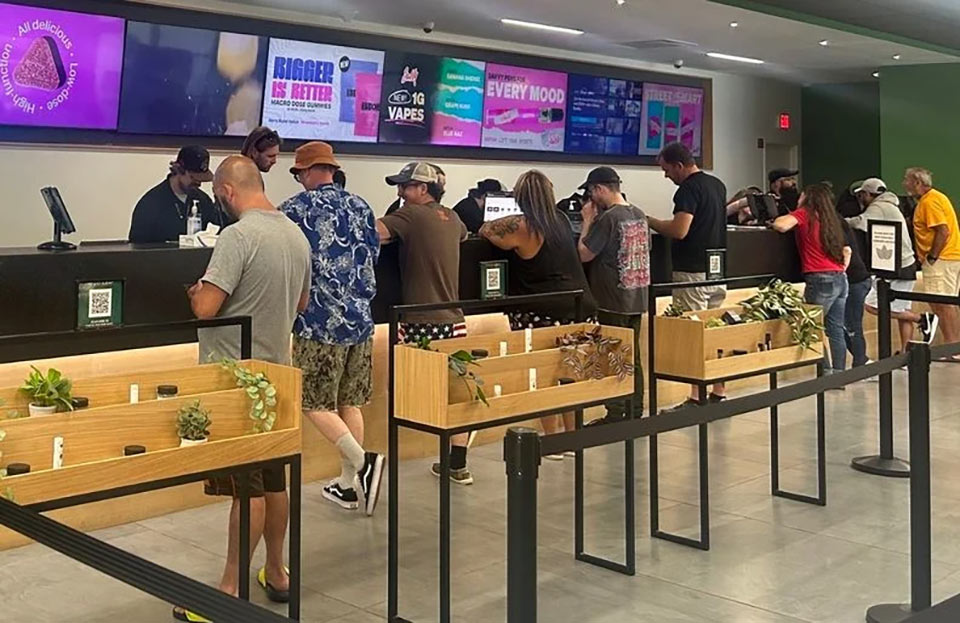This story was republished with permission from Crain’s Cleveland Business.
Ohio dispensaries sold more than $44.05 million in adult-use marijuana in August, according to the latest figures from the Ohio Division of Cannabis Control.
Because rec sales began Aug. 6, that amount reflects just shy of a full month of adult-use retail activity.
“That is $44 million that we took out of the illicit market and away from Michigan dispensaries,” said Tom Haren, spokesman for the OHCANN trade group and a key figure behind last November’s Issue 2 adult-use cannabis referendum. “I think it was a terrific first month.”
That monthly total includes approximately $11.08 million in non-medical sales recorded during the last week of the month.
On average, there was approximately $1.69 million in adult-use marijuana sold in the state per day in August.
Sales were strongest during the first week of adult-use with an average of $2.3 million in sales per day between the Tuesday when those sales began and the following Saturday.
In the three weeks since, average sales per day have settled around $1.5 million to $1.58 million.
If extrapolating the average daily adult-use marijuana sales amount in August across six additional days, Ohio may have recorded around $54.19 million in rec sales for its first month.
Whether looking at that potential figure or the actual number of $44.05 million, adult-use sales activity in Ohio appears relatively strong compared with the first month in some other markets.
Michigan, for example, recorded approximately $7 million in adult-use sales in December 2019, its first month of rec, according to state figures. However, Michigan had just five adult-use retailers at the time, three of which ran out of supplies.
Illinois recorded $39 million in adult-use sales in its first month of rec in January 2020, according to state data. That figure may also have been higher had the state not faced a product shortage that forced some shops to close.
There is no shortage of product in Ohio and nearly 100 active dispensaries in the state, so this market is not facing the challenges those others saw in the early days of their adult-use programs.
Missouri, meanwhile, had its first month of adult-use marijuana sales in February 2023. The state reported $71.7 million in adult-use sales that month (about $2.56 million per day on average), which vastly exceeded expectations. That same month, the state recorded $31.2 million in medical marijuana sales.
Over the same time frame as the first month of adult-use in Ohio — so looking at Aug. 6 through the end of the month — there was approximately $31.59 million in medical sales, or about $1.21 million per day on average in the state.
Operators are generally pleased with the first month of rec marijuana sales in Ohio.
“We’re just 26 days in, and consumers are just dipping their toes in the water with legal cannabis for the first time, so this is a solid launch right out of the gate,” said Jason Erkes, spokesman with Chicago-based Cresco Labs (OTC: CRLBF), which operates the Sunnyside brand of dispensaries. “With a minimal ramp-up period and no marketing or advertising, the revenue numbers are beyond impressive and will continue to grow as more stores open and more awareness builds about legal cannabis across the state.”
Haren said his expectation is that Ohio’s adult-use market will continue to grow from here as consumers adjust, more retailers open and prices come down.
As of the latest DCC data, the average pre-tax price for marijuana flower in Ohio during the last week of August was $25.46 per one-tenth of an ounce (or a so-called “day unit”) and approximately $9 per gram compared to $26.59 per one-tenth of an ounce and $9.40 per gram at the start of the month.

 California Cannabis Updates1 year ago
California Cannabis Updates1 year ago
 Breaking News1 year ago
Breaking News1 year ago
 best list1 year ago
best list1 year ago
 Business12 months ago
Business12 months ago
 cbd1 year ago
cbd1 year ago
 Bay Smokes1 year ago
Bay Smokes1 year ago
 autoflower seeds12 months ago
autoflower seeds12 months ago
 cannabis brands12 months ago
cannabis brands12 months ago
















































